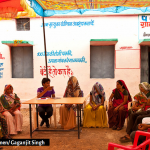
How States Drag their Feet on Citizens’ Participation in Urban Governance: A Case Study
20 November 2020
In my last blog, I had observed that while the structures for participation in public governance in rural areas have progressed across the country, there has not been similar action with respect to promoting citizens’ participation in urban governance. I had given the details of how Karnataka, generally considered to be one of the champions of democratic decentralisation in India, had progressively introduced legislative and process changes to strengthen the structures for rural participation.
Such changes have focussed around defining the manner in which Gram Sabhas, and below them, Ward Sabhas should meet, as also the functional mandates that have been given to them. I detailed how in the legal structure now, Gram Sabhas have strong powers of planning, selection of beneficiaries and monitoring the implementation of their plans.
It is arguable whether these strong legal structures have improved governance in rural areas, but there is no doubt that they exist and they strengthen the hands of any public spirited citizen who is willing to use the laws that are beneficial to her, to keep a close watch on her public representatives.
Does the same pro-people ethos inform the letter and spirit of laws relating to urban governance? Sadly, no. The case study of Karnataka will highlight this paradox effectively.
Under the Constitution, in urban areas, there shall be Wards Committees, consisting of one or more wards, within municipalities with more than three lakh population. The state legislature is empowered to pass laws for the composition and the territorial area of a Wards Committee, and the manner in which the seats in a Wards Committee shall be filled.
The Constitution mandates that the Councillor from a ward shall be a member of the Wards Committee of that ward and shall be chairperson. States can also form other committees apart from the Wards Committees.
In 1994, the Karnataka Municipal Corporations Act, 1976 was amended to comply with the above Constitutional mandate. Wards Committees were made mandatory for cities with a population of three lakhs or more. Ward Committees could be established for more than one ward, and they comprised Territorial councillors, up to five persons nominated by the government qualified for being elected as a councillor. These councillors should have knowledge and experience in municipal administration.
Two members from NGOs or CBOs working within the Wards Committee Area, are also nominated by the government. The terms of office of these members were made co-extensive with the councillor’s terms. The functions, duties and procedures to be adopted by the Wards Committee were not prescribed in the law but were left for the government to notify separately.
Nearly 30 years after the enactment of the 74th amendment, it seems that we are back to square one, as far as peoples’ participation in urban governance is concerned in Karnataka.
This law was a non-starter. The government clearly intended it to be a formality, undertaken only to fulfill the constitutional mandate. It took three more years for the rules to be promulgated under the law- that is in 1997. Two more years after the issuance of the rules, one Wards Committee was constituted for every three wards in Bengaluru city. No committees were constituted in any other city in Karnataka. A study in 2001 by a city-based NGO, Civic, showed that these committees went defunct.
Fresh moves to constitute committees began again in 2001 after a newly elected body assumed office. However, it took two more years for them to be constituted; Wards Committees existed from 2003 to 2006.
In 2006, the elected body was superseded and an official administrator appointed. Naturally, since councillors did not exist, no Wards Committees were constituted. The Administrator continues for four years, totally unconstitutionally, but the excuse given by the government was that they were enlarging the boundaries of the city limits.
In 2010, elections were held to the newly constituted Brihat Bangalore Mahanagar Palika, but Ward Committees were not constituted. The Government of India had by then rolled out the Jawaharlal Nehru Urban Renewal Mission (JNNURM), under which funds for urban infrastructure and services were to be released only on the fulfillment of several conditions by state governments. This included the enactment of a citizens participation law. The Government of India, in order to guide the states, also released a model legislation, popularly known as the Nagararaj bill.
Finally, relenting under pressure from the Union government, which threatened to block the release of funds under the JNNURM to the state until the law for citizens participation was passed, the Karnataka government amended the provisions of the Karnataka Municipal Corporations Act in 2011. The new provisions constituted one Wards Committee for every ward, and also created the Area Sabhas at the level of one or more polling stations below the committees.
The state made no secret of its reluctance to amend the law to provide for stronger structures for peoples participation in urban governance, ‘The Statement of Objects and Reasons’ made it amply clear that the amendment was being made at the behest of the Union government. It states as follows:
“One of the mandatory reforms to be undertaken by the State Government under the Jawaharlal Nehru National Urban Renewal Mission is to enact a law providing for community participation in the Municipal Corporations having a population exceeding three lakhs. It requires the establishment of a three tier structure of governance at the level of municipal council, ward Committee and area sabha. The State Government, in the Memorandum of Agreement (MOA) entered into with Government of India has already committed to fulfil this reform, and passed orders dated: 05-10-2007 affirming the same.
Therefore, it is considered necessary to amend the Karnataka Municipal Corporations Act, 1976 (Karnataka Act 14 of 1977) to provide for the following:- Constitution of Area Sabhas and Ward Committees, Entrusting functions and duties to the Area Sabha and Ward Committees and Institutionalizing citizen participation. Hence the Bill.”
However, there are glaring differences between GOI’s model Nagararaj Bill and actual Area Sabha and Ward Sabha provisions introduced into the KMC Act in 2011. While the Nagararaj Bill suggested that Area Sabha representatives were to be elected, the KMC Act provided for their nomination by Councillors. The Nagararaj bill provided much more executive powers for Area Sabha and Ward Committees than what the KMC Act gave. The worst provision in the KMC Act was that Councillors were given a veto power over decisions of the Wards Committees. There was no such provision in the Nagararaj bill.
Notwithstanding the weak provisions in the law, it would still have been a step forward if the Ward Committees, however flawed were constituted and allowed to function. However, the government was in no hurry to operationalise these provisions, and it took more pressure and court action to constitute them and get them off the ground.
In 2012, a Public Interest Litigation in the Karnataka High Court on Solid Waste Management (SWM) is of note. NGOs who got themselves impleaded into the petition strongly contended that, only if Ward Committees are set up and given powers, can the garbage problem be solved. This put pressure on the state government to take action, particularly when in 2013, the High Court directed it to constitute Ward Committees, and gave it a month’s time to frame rules.
It took three more years for the rules to be issued. Ward Committees were finally constituted in 2017. More directions were issued by the High Court, in the Solid Waste Management PIL to give the committees powers to manage SWM, and prepare action plans for garbage management.
When, finally, only 25% of Ward Committees met, and very few made the action plan, the Court went to the extent of fining the BBMP commissioner Rs. 50,000 for not conducting Ward Committees. He, without turning a hair, collected the fine from all errant councilors and officials responsible!
As we go to press now, just as momentum had gathered on the conduct of Wards Committee meetings, the pandemic struck and all of them ceased functioning. They have been disbanded now because elections to the BBMP have been postponed due to the pandemic.
Thus, nearly 30 years after the enactment of the 74th amendment, it seems that we are back to square one, as far as peoples’ participation in urban governance is concerned in Karnataka.
T.R. Raghunandan is an Advisor at the Accountability Initiative.





